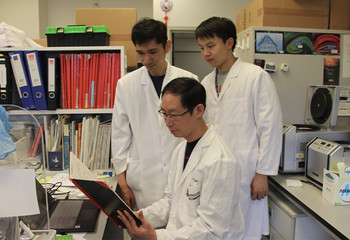Dec 28, 2020
Media Coverage: Dr Lai Kwok On's study featured at Croucher Science Week's Blog
Dr Lai Kwok On's study was featured at Croucher Science Week's Blog. (For Chinese version, please click here. 請按此查看中文版本。)
Unlocking the role of TBC1D24 protein in our brain

Dr Lai Kwok On received his Bachelor of Biochemistry from the University of Hong Kong. He pursued postgraduate studies at the Hong Kong University of Science and Technology. With the help of his Croucher Foundation Fellowship, he then undertook postdoctoral research at the University of California, Los Angeles, in the United States. He is now an Assistant Professor in the School of Biomedical Sciences, Faculty of Medicine, at the University of Hong Kong. Dr Lai received his Croucher Fellowship in 2003.
A research team led by Dr Lai Kwok On (Croucher Fellowship 2003) at the University of Hong Kong has uncovered a previously uncharacterised function of the TBC1D24 gene in the maintenance of neuronal connections in the brain, a discovery that could eventually lead to new therapeutic pathways for patients suffering from epilepsy and intellectual disability.
Human brain function depends on the proper maintenance of neuronal connections. Billions of neurons are interconnected with each other at junctions called synapses. Emerging studies have pointed out that many inherited brain disorders, including epilepsy and intellectual disability, are caused by changes in the abundance and structure of these connections.
Previous research has identified more than 50 mutations on the TBC1D24 gene in patients suffering epilepsy and intellectual disability, yet the gene’s function remains unresolved.
With the assistance of super-resolution microscopy, Lai and his team found that the protein encoded by TBC1D24 is present on dendritic spines of neurons in the hippocampus, a brain region critical to learning and memory.
As a first step to understanding the TBC1D24 protein’s function, the team injected viruses that carry short hairpin RNAs into the hippocampus of mouse models to prevent the synthesis of this protein.
The researchers observed that mice with TBC1D24 deficiency limited to the hippocampus performed worse in a memory task that associated fear with an environmental context. Furthermore, these mice displayed abnormal behaviours, such as hyperactivity and increased anxiety.
It was also found that a particular disease-causing single nucleotide mutation that results in one amino acid change (from phenylalanine to leucine) on the protein can diminish its stability.
Mice carrying the mutation on both chromosomes had hyper-excitable hippocampal neurons and did not survive long after birth.
Mice carrying only one copy of the TBC1D24 point mutation survived well. However, compared with normal mice, the mutant animals exhibited poor fear memory and their neurons in the hippocampus possessed fewer dendritic spines.
These findings, published in PLoS Genetics, suggest that impaired development of dendritic spines in the hippocampus may contribute to the intellectual disability of individuals carrying TBC1D24 gene mutations.
“Many patients with TBC1D24 mutations have drug-resistant epilepsy. The transgenic mice generated in this study represent a promising animal model to test potential therapeutic candidates,” Lai noted.
Extended reading:
- Dr Lai’s personal page in The Croucher Foundation: https://scholars.croucher.org.hk/scholars/lai-kwok-on
- Dr Lai’s personal page in The University of Hong Kong: https://www.sbms.hku.hk/staff/kwok-on-lai
- The scientific article Dr Lai published in PLoS Genetics in 2020: https://journals.plos.org/plosgenetics/article?id=10.1371/journal.pgen.1008587

